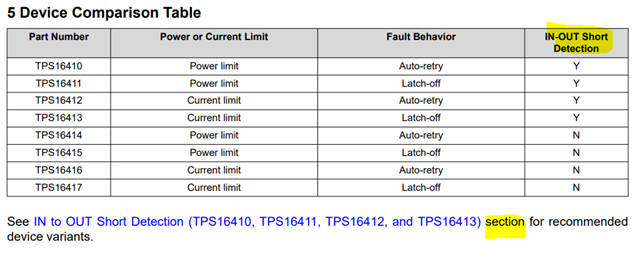- Ask a related questionWhat is a related question?A related question is a question created from another question. When the related question is created, it will be automatically linked to the original question.
This thread has been locked.
If you have a related question, please click the "Ask a related question" button in the top right corner. The newly created question will be automatically linked to this question.
Hi,
We are using a design using TPS16412 IC. We are having a transient load which switches the current between 115mA to around 450mA.
Our voltage requirement across the eFuse is 26V and at the OVP pinn, the voltage set with a resistor divider is 1.37V.
The ILIM is set at 600mA and IOCP is set at 1A.
While we are using the load in constant current state, the efuse is perfectly fine, but while using it as transient load, the eFuse is turning off.
What can be the issue
Hi Rohit,
Thanks for considering our device.
IN to OUT Short Detection feature might be triggering with transient load. Please use TPS16416 variant to overcome this.
For background, refer corresponding section in data sheet and let us know

Best Regards
Rakesh

Hi Rakesh,
Thanks for the response.
Are there any options in TPS16412 to bypass the In to Out short detection? We are checking to make the TPS16412 work in our design; and hence the query.
Additionally, we are observing that the FLT# is always asserted LOW, as soon as the VCC and VIN(both coming from same supply(ie: 26V). This is true even if the EN is HIGH or LOW; but even then the TPS16412 is working as intended, unless tested with transient load. Attaching the schematics section for your reference
Hi Rohit,
Unfortunately, there is no external option to bypass the In to Out short detection in TPS16412.
Let me check on FLT# issue and get back. Can you test again with 100kΩ pull-up resistor at FLT# pin and confirm the FLT# issue.
Best Regards,
Rakesh
Hi Rohit,
Have you tested with 100kΩ pull-up resistor at FLT# pin ?
Best Regards,
Rakesh
Hi Rakesh,
With changing the pull up resistor to 100K, there was not change observed. The efuse was turning off once we feed in the TDD signal
We had some other observations while changing the Riocp, Rilim and Cidly which are as below.
Case 1 : Riocp - 16.2K
Cidly - 0.01uFuF
Rilim - 16.2K
Observation: eFuse turning off once the TDD signal is sent. Please confirm whethe rthere are some impact for these pins on the transient load conditions as minute tuning in these parts where giving different results given the current switching was well within the ILIM.
Case 2 : Riocp - 16.2K
Cidly - 0.01uF
Rilim - 16.2K
Cdvdt - 220uF
Observation: The efuse was working uptil 20 minutes and still not getting off. We are doing multiple iterations of the same and will get back to you
Currently the mail concern is regarding the FLT pins state, it is still LOW only but the eFuse is working fine. Could you please comment on this.
As already mentioned our use case is to provide 26V coming in to the output Power Amplifier we have. Our output bus capacitance will be only around 30uF. Our operation is a TDD operation where the frequency band of operation is 3.55GHz to 3.7GHz with 75%duty cycle, ie the Power amplifier in consideration will be working for 75% of each cycle.
Kindly consider these test cases and give a suggestion as how to move forward.
Hi Rohit,
1. When there is no load then TPS16412 is working fine? FLT pin is fine?
2. When load is applied then FLT stays low?
Regards
Kunal Goel
Hi Rakesh,
In both the cases the FLT status is Low
But by changing the dvdt capacitor to 220nF, it is working fine.
Now the only concern is regarding the FLT pin status
Hi Rohit,
1. Please share waveforms for the case when load is only capacitive and no downstream load. Please probe, VIN,EN,OVP,FLT,OUT. One reason for FLT low could be device is hitting TSD and large dvdt cap reduces inrush current to prevent TSD.
2. You have a case where VOUT is fine but FLT is low? or always when FLT is low then VOUT is also gone?
2. Also what do you mean when you say TDD signal is sent?
Regards
Kunal Goel